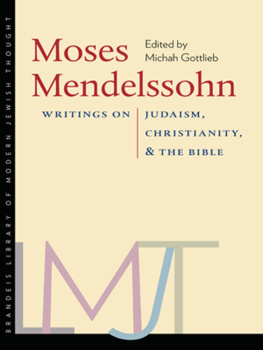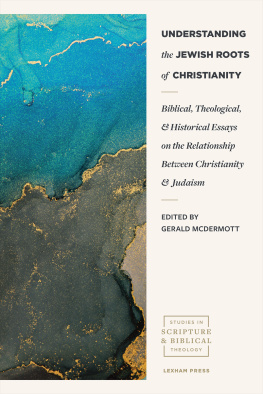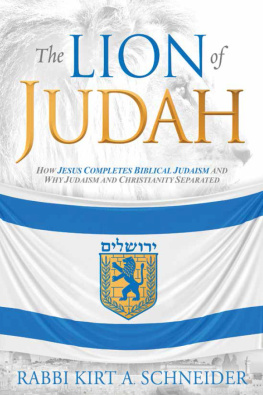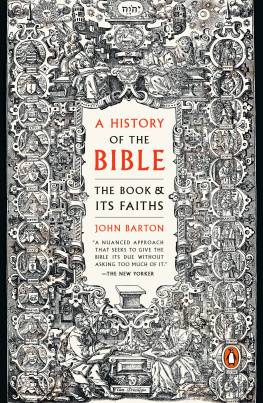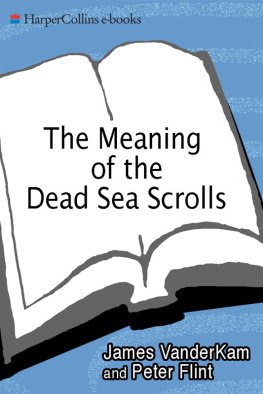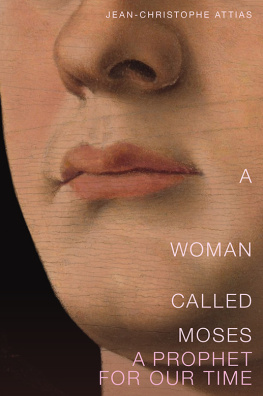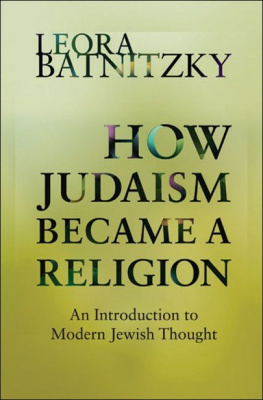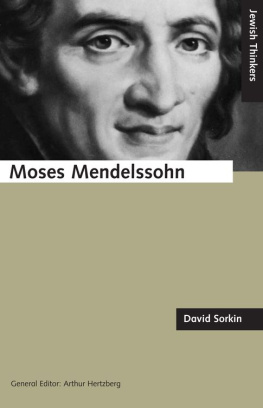Gottlieb Michah - Moses Mendelssohn: writings on Judaism, Christianity, and the Bible
Here you can read online Gottlieb Michah - Moses Mendelssohn: writings on Judaism, Christianity, and the Bible full text of the book (entire story) in english for free. Download pdf and epub, get meaning, cover and reviews about this ebook. City: Waltham;Mass, year: 2011, publisher: Brandeis University Press, genre: Religion. Description of the work, (preface) as well as reviews are available. Best literature library LitArk.com created for fans of good reading and offers a wide selection of genres:
Romance novel
Science fiction
Adventure
Detective
Science
History
Home and family
Prose
Art
Politics
Computer
Non-fiction
Religion
Business
Children
Humor
Choose a favorite category and find really read worthwhile books. Enjoy immersion in the world of imagination, feel the emotions of the characters or learn something new for yourself, make an fascinating discovery.
- Book:Moses Mendelssohn: writings on Judaism, Christianity, and the Bible
- Author:
- Publisher:Brandeis University Press
- Genre:
- Year:2011
- City:Waltham;Mass
- Rating:5 / 5
- Favourites:Add to favourites
- Your mark:
- 100
- 1
- 2
- 3
- 4
- 5
Moses Mendelssohn: writings on Judaism, Christianity, and the Bible: summary, description and annotation
We offer to read an annotation, description, summary or preface (depends on what the author of the book "Moses Mendelssohn: writings on Judaism, Christianity, and the Bible" wrote himself). If you haven't found the necessary information about the book — write in the comments, we will try to find it.
Gottlieb Michah: author's other books
Who wrote Moses Mendelssohn: writings on Judaism, Christianity, and the Bible? Find out the surname, the name of the author of the book and a list of all author's works by series.
Moses Mendelssohn: writings on Judaism, Christianity, and the Bible — read online for free the complete book (whole text) full work
Below is the text of the book, divided by pages. System saving the place of the last page read, allows you to conveniently read the book "Moses Mendelssohn: writings on Judaism, Christianity, and the Bible" online for free, without having to search again every time where you left off. Put a bookmark, and you can go to the page where you finished reading at any time.
Font size:
Interval:
Bookmark:
THE TAUBER INSTITUTE SERIES FOR
THE STUDY OF EUROPEAN JEWRY
Jehuda Reinharz, General Editor
Sylvia Fuks Fried, Associate Editor
Eugene R. Sheppard, Associate Editor
THE BRANDEIS LIBRARY OF MODERN JEWISH THOUGHT
Eugene R. Sheppard and Samuel Moyn, Editors
This library aims to redefine the canon of modern Jewish thought by publishing primary source readings from individual Jewish thinkers or groups of thinkers in reliable English translations. Designed for courses in modern Jewish philosophy, thought, and intellectual history, each volume features a general introduction and annotations to each source with the instructor and student in mind.
Moses Mendelssohn: Writings on Judaism, Christianity, and the Bible
Michah Gottlieb, editor
Jews and Race: Writings on Identity and Difference, 18801940
Mitchell B. Hart, editor
FOR THE COMPLETE LIST OF BOOKS THAT ARE AVAILABLE
IN THIS SERIES, PLEASE SEE WWW.UPNE.COM
BRANDEIS UNIVERSITY PRESS
An imprint of University Press of New England
www.upne.com
2011 Brandeis University
All rights reserved
Manufactured in the United States of America
Designed by Eric M. Brooks
Typeset in Albertina and Verlag by
Passumpsic Publishing
For permission to reproduce any of the material in this book,
contact Permissions, University Press of New England, One Court
Street, Suite 250, Lebanon NH 03766; or visit www.upne.com
Library of Congress Cataloging-in-Publication Data
Mendelssohn, Moses, 17291786.
[Selections. English. 2011]
Moses Mendelssohn: writings on Judaism, Christianity, and the
Bible / edited by Michah Gottlieb; translations by Curtis Bowman,
Elias Sacks, and Allan Arkush.
p. cm.(The Tauber Institute series for the study of European
Jewry) (The Brandeis library of modern Jewish thought)
Includes bibliographical references and index.
ISBN 978-1-58465-684-5 (cloth: alk. paper)
ISBN 978-1-58465-685-2 (pbk.: alk. paper)
ISBN 978-1-61168-214-4 (e-book)
1. JudaismWorks to 1900. 2. Bible. O.T.Criticism,
interpretation, etc. 3. JudaismRelationsChristianity.
4. Christianity and other religionsJudaism. 5. Philosophy,
German18th century. I. Gottlieb, Michah. II. Bowman, Curtis.
III. Sacks, Elias. IV. Arkush, Allan, 1949 V. Title. VI. Title: Writings
on Judaism, Christianity, and the Bible. VII. Series.
B2690.A5 2011
296.3dc23 2011027263
5 4 3 2 1
For my children
Gabriella, Jordanna, and Itai
It is with great excitement that we present a volume of the Brandeis Library of Modern Jewish Thought devoted to Moses Mendelssohn. This volume offers both the teacher and student his seminal writings, many of which appear here for the first time in English translation. The texts are drawn from his German and Hebrew writings across literary genres: from philosophical treatise to epistolary discussion and polemical exchange; and from commentary on Bible and medieval Jewish thought to excurses on epistemology, theology, ethics, and education. They illuminate the difficult challenges that Mendelssohn faced and the heated controversies with which he contended, and underscore his account of and vision for humanity. The reader is thereby able to go beyond the customary one-dimensional portraits of Mendelssohn and engage with him as a central figure at the intersection of religious and philosophical Enlightenment in the latter half of the eighteenth century.
Eugene R. Sheppard and Samuel Moyn, Editors
The Brandeis Library of Modern Jewish Thought
Moses Mendelssohn and the Project of Modern Jewish Philosophy
Moses Mendelssohn (17291786) is often considered the founder of modern Jewish philosophy, and even of modern Judaism. This reflected the view that while Maimonides was a guide for perplexed Jews in the face of medieval challenges to Judaism, Mendelssohn was a new guide in the face of modern challenges. As great as Maimonides was, modernity presented problems that he never encountered, including how to reconcile obedience to the Torah with life in a liberal state where Jews could be equal citizens. Mendelssohn guided the way.
During his life, and even more so after his death, Mendelssohn was revered as the founding father of one of the most important movements in modern Judaism, the Haskalah, or Jewish Enlightenment.
By the latter half of the nineteenth century, however, Mendelssohn had come Orthodox and Reform thinkers alike, though for different reasons, increasingly blamed Mendelssohn for the widespread defection from Judaism by young Jews. For many Orthodox thinkers, this defection stemmed from the rationalist nature of Mendelssohns philosophy of Judaism, which they thought undercut all justification for halakhic observance, while many Reform thinkers believed it was Mendelssohns atavistic adherence to Halakhah that alienated the young Jews who turned to a more spiritually free Christianity.
The two hundredth anniversary of Mendelssohns birth was 1929. While there had been Mendelssohn celebrations since 1829, those of 1929 were unprecedented. According to Christhard Hoffmann, there was hardly a Jewish community in Germany that did not organize a Mendelssohn jubilee celebration.
Moses Mendelssohn was born Mosheh ben Mendel on 6 September 1729, in the rural hamlet of Dessau in what later became Germany. His father, Mendel Heymann, was a Torah scribe, teacher, and custodian in the local synagogue. These professions were not lucrative and put him at the bottom of the Jewish communitys social hierarchy. Mosess mother, Bela Rachel Sarah, was of illustrious lineage. She was a direct descendent of Rabbi Moses Isserles (152072), author of authoritative glosses on the most important codification of Jewish law, the Shulhan Arukh (Set table). At the age of six, Moses began studying the typical Jewish curriculum, which consisted of the Talmud and its commentaries. He learned the entire Bible by heart, and he taught himself Hebrew grammar, something quite unusual for traditional Jews at the time. When he was eleven, he was selected to be part of an elite group of students who studied at the home of Rabbi David Frnkel (170762), author of Korban Haeda (Sacrifice of the community), one of the most important commentaries on the Jerusalem Talmud. Mendelssohns studiousness was legendary. As an adult, he had a curved spine, which he attributed to the long hours he spent poring over books as a youth.
In 1743, Frnkel received a post in Berlin, and the fourteen-year-old Mendelssohn followed him there. In Berlin, Mendelssohn spent most of his time studying in the talmudic beit midrash (house of study), but he was soon opening up to wider intellectual vistas. He was fortunate to meet Israel Samocz (17001772), a Jew deeply learned in mathematics, science, and medieval Jewish philosophy. Samocz instructed Mendelssohn in key Hebrew works of Jewish philosophy, most notably Maimonidess Guide of the Perplexed and Judah Halevis Kuzari. At the time, Berlin was an exciting intellectual and cultural hub, attracting scientists, philosophers, and poets from all over Europe. The key to gaining access to the citys cultural and social life was knowledge of the important works of European literature, both ancient and modern, which required significant linguistic proficiency. Mendelssohns first language was Yiddish; he proceeded to learn German, Latin, Greek, French, and English in short order. Although he had tutors who helped him, he accomplished most of this on his own. He developed such a proficiency in German that Christians celebrated his literary style. Despite his philosophical fame, Mendelssohn never held a formal academic position. He supported himself by working in a silk factory, eventually becoming a partner.
Font size:
Interval:
Bookmark:
Similar books «Moses Mendelssohn: writings on Judaism, Christianity, and the Bible»
Look at similar books to Moses Mendelssohn: writings on Judaism, Christianity, and the Bible. We have selected literature similar in name and meaning in the hope of providing readers with more options to find new, interesting, not yet read works.
Discussion, reviews of the book Moses Mendelssohn: writings on Judaism, Christianity, and the Bible and just readers' own opinions. Leave your comments, write what you think about the work, its meaning or the main characters. Specify what exactly you liked and what you didn't like, and why you think so.

